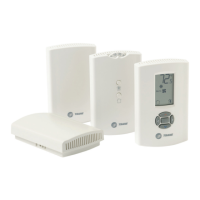BAS-SVX04C-EN • Wireless Sensors 11
Pre-Installation
• High traffic areas (to reduce accidental damage or tampering)
• Metal barriers between the receiver and the sensor (for example, plastered walls with
metal lathe or metal roof decks)
• Thick, solid concrete walls between the receiver and the sensor
• Placing the sensor inside metal enclosures
Height Requirements
It is recommended that you mount the back plate a maximum distance of 54 inches above
the floor. If a parallel approach by a person in a wheelchair is required, reduce the
maximum height to 48 inches.
Note: Consult section 4.27.3 of the 2002 ADA (Americans with Disability Act) guideline,
and local building codes, for further details regarding wheelchair requirements.
Mounting Surfaces
Using the hardware provided, mount the back plate of the receiver and the sensor to a
flat surface such as sheetrock or plaster, or an electrical junction box. The sensor must
be mounted plumb for accurate temperature control and to ensure proper air movement
through the sensor.
• Receivers: Use the included hardware.
•Sensors:
– If mounting onto sheetrock or plaster, use the plastic threaded anchors (pre-
drilling holes is not usually necessary) and the two M3.5 x 20 mm mounting
screws.
– For mounting onto an electrical junction box, use the two 6-32 x 3/4 in. screws.
Address Setting
The process of establishing communication between a receiver and sensor is referred to
as association. The following limitations apply:
• Each associated receiver/sensor set that communicates within the reception range of
the wireless system must have a unique address.
• It is not possible to associate more than one sensor to a receiver, nor is it possible to
associate more than one receiver to a sensor.
To associate a receiver and sensor, the two devices must have their rotary address
switches set to the same address.
Important: Set the addresses before applying power to the receiver and before
removing the insulation strip (Figure 1, p. 12) from the sensor.

